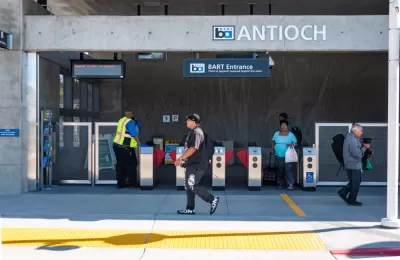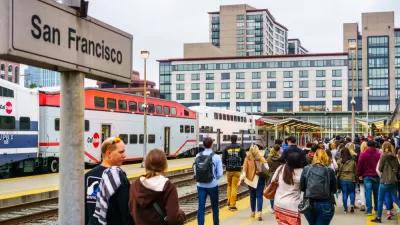Advocates for ‘seamless’ transit are calling on California state leaders to tie a consolidation study to a one-time injection of funding into the Bay Area’s transit systems.

In an op-ed for Streetsblog San Francisco, Ian Griffiths argues for the consolidation of the Bay Area’s multiple transit agencies, which face significant funding shortages and projected service cuts.
Griffiths acknowledges the need for immediate relief: “Legislators must provide significant one-time funding for transit in the upcoming budget to avert service cuts if they are serious about their commitment to transit, equity, and fighting climate change.”
But “If there was ever a time to take a hard look at agency consolidations – combining some of our 27 agencies to both improve decision-making, capacity, effectiveness, and efficiency – it is now.”
Griffiths notes that riders have been calling for a seamless regional system. Advocacy group Seamless Bay Area argues that “Bay Area Transit needs a Regional Network Manager entity with systemwide accountability for public transit – capable of planning and running transit as one network.” Consolidating, for example, BART and Caltrain “would enable speedier implementation of integrated service and fares between the two systems (enabling quicker ridership regrowth), improved capital project planning, faster project delivery, and improved agency capacity.”
Griffiths concludes by pointing out that consolidating the region’s transit requires state action. “As the state considers one-time funding for transit operations in this year’s budget, legislators can help support a seamless transit system by calling for a consolidation study to be completed over the next year that identifies key consolidation options, benefits, and costs for the legislature to consider implementing.”
FULL STORY: Op-ed: Consolidate the Bay Area’s Transit Agencies

Planetizen Federal Action Tracker
A weekly monitor of how Trump’s orders and actions are impacting planners and planning in America.

Restaurant Patios Were a Pandemic Win — Why Were They so Hard to Keep?
Social distancing requirements and changes in travel patterns prompted cities to pilot new uses for street and sidewalk space. Then it got complicated.

Map: Where Senate Republicans Want to Sell Your Public Lands
For public land advocates, the Senate Republicans’ proposal to sell millions of acres of public land in the West is “the biggest fight of their careers.”

Maui's Vacation Rental Debate Turns Ugly
Verbal attacks, misinformation campaigns and fistfights plague a high-stakes debate to convert thousands of vacation rentals into long-term housing.

San Francisco Suspends Traffic Calming Amidst Record Deaths
Citing “a challenging fiscal landscape,” the city will cease the program on the heels of 42 traffic deaths, including 24 pedestrians.

California Homeless Arrests, Citations Spike After Ruling
An investigation reveals that anti-homeless actions increased up to 500% after Grants Pass v. Johnson — even in cities claiming no policy change.
Urban Design for Planners 1: Software Tools
This six-course series explores essential urban design concepts using open source software and equips planners with the tools they need to participate fully in the urban design process.
Planning for Universal Design
Learn the tools for implementing Universal Design in planning regulations.
Heyer Gruel & Associates PA
JM Goldson LLC
Custer County Colorado
City of Camden Redevelopment Agency
City of Astoria
Transportation Research & Education Center (TREC) at Portland State University
Camden Redevelopment Agency
City of Claremont
Municipality of Princeton (NJ)





























